

EPALE focus: Non-formal and informal learning. From 15–19 August EPALE will have a special focus on non-formal and informal learning.
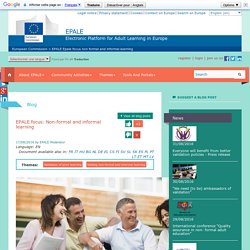
Validation of non-formal and informal learning – a holistic approach by Scotland. EPALE’s Thematic Coordinator for Quality, Andrew McCoshan, looks at practices in Scotland and finds there is much that will be of interest to practitioners in other countries.
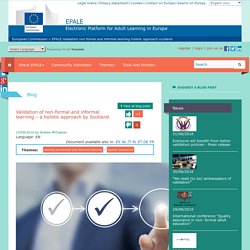
Compared to many other countries, Scotland has a well-developed approach to validation of non-formal and informal learning (or recognition of prior learning – RPL) that goes back several years. Three aspects particularly stand out: RPL is embedded in the Scottish Credit and Qualifications Framework (SCQF);The use of RPL is encouraged and supported through the provision of guidelines and resources.There is clarity around the type of support learners need – facilitation.
Embedding RPL in the system RPL is integral to the Scottish Credit and Qualifications Framework (SCQF): six of the 25 principles related to the SCQF are dedicated to RPL, as set out in the SCQF Handbook (link is external). Supporting the providers of RPL Being clear about what the support role means Key roles for facilitators include:
Skills Agenda for Europe – il decalogo Ue per le competenze. Dopo la Garanzia Giovani, arriva la Skills Guarantee, prima azione dell'Agenda Ue per le competenze appena lanciata da Bruxelles > Your first EURES job – bando Ue per lavoro giovani > Forum mercato unico – consultazione Ue su piani d'azione professioni Annunciata nel programma di lavoro 2016 della Commissione, la Skills Agenda for Europe è un piano strategico in dieci mosse che mira a migliorare le competenze degli europei e a stimolare occupazione e crescita nell'Ue.
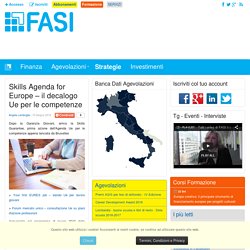
Tra le azioni previste vi è la Skills Guarantee, che richiama la Garanzia Giovani e vuole assicurare alla popolazione adulta le competenze di base necessarie a trovare un lavoro dignitoso. > Young Digital - formazione ICT per iscritti a Garanzia Giovani > Piano riforma professioni – Italia aggiorna database nazionale Delle altre nove azioni, tre sono di avvio immediato: Fondi Ue - in arrivo 4 bandi su diritti, uguaglianza e cittadinanza. Da settembre sarà possibile aderire ai bandi 2016 del programma Ue Diritti, uguaglianza e cittadinanza 2014-2020.
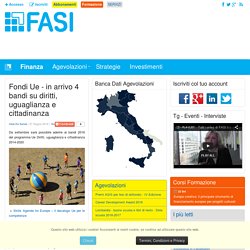
Det 9419 07 Redacted. Linee Guida processo di validazione competenze sito. Valico validazione libretto formativo. La validazione dell’apprendimento non formale e informale è una opportunità lanciata da alcuni anni a sistema in diversi paesi europei e fortemente promossa nelle sedi comunitarie ed internazionali quale elemento strategico di innovazione e ottimizzazione dei sistemi di apprendimento per la valorizzazione delle persone e lo sviluppo della occupabilità.
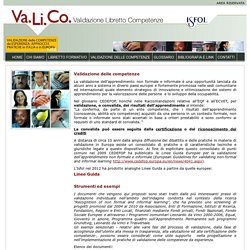
Nel glossario CEDEFOP, nonché nelle Raccomandazioni relative all’EQF e all’ECVET, per validazione, o convalida, dei risultati dell’apprendimento si intende: “La conferma, da parte di un ente competente, che i risultati dell’apprendimento (conoscenze, abilità e/o competenze) acquisiti da una persona in un contesto formale, non formale o informale sono stati accertati in base a criteri prestabiliti e sono conformi ai requisiti di uno standard di convalida. Validazione competenze da esperienza approcci pratiche in Italia in Europa. Skills. The way we work, learn, take part in society and lead everyday life changes constantly in line with technological developments, global and demographic challenges.
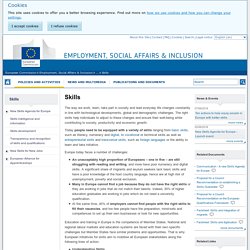
The right skills help individuals to adjust to these changes and ensure their well-being while contributing to society, productivity and economic growth. Today people need to be equipped with a variety of skills ranging from basic skills, such as literacy, numeracy and digital, to vocational or technical skills as well as entrepreneurial skills and transversal skills, such as foreign languages or the ability to learn and take initiative.
Agenda for new skills and jobs - Employment, Social Affairs & Inclusion. This initiative is how the Commission will help the EU reach its employment target for 2020: 75% of the working-age population (20-64 years) in work.
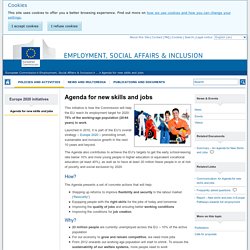
Launched in 2010, it is part of the EU's overall strategy – Europe 2020 – promoting smart, sustainable and inclusive growth in the next 10 years and beyond. The Agenda also contributes to achieve the EU's targets to get the early school-leaving rate below 10% and more young people in higher education or equivalent vocational education (at least 40%), as well as to have at least 20 million fewer people in or at risk of poverty and social exclusion by 2020. How? The Agenda presents a set of concrete actions that will help: Stepping up reforms to improve flexibility and security in the labour market ('flexicurity') Equipping people with the right skills for the jobs of today and tomorrow Improving the quality of jobs and ensuring better working conditions Improving the conditions for job creation Why?
New Skills for New Jobs. Validation of non-formal and informal learning - European Association for the Education of Adults. In the context of the principle of learning throughout life, the identification and validation of non-formal and informal learning aim at making visible and valuing the full range of knowledge and competences held by an individual, irrespective of where or how they have been acquired.
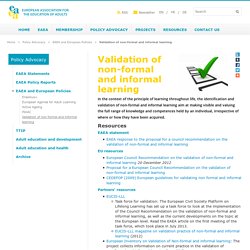
Resources EAEA statement. Validation_INFL_Council-recomm_Dec-2012.pdf. Seminar on the validation of non-formal and informal learning. Draft Programme Download the detailed programme Joint seminar of the European Commission (DG EAC) and Cedefop in association with the Irish Presidency of the Council of the EU Mechelen, 9-10 April 2013.
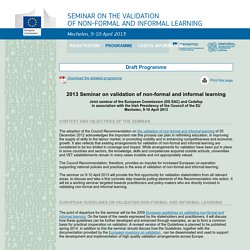
Validation of non-formal and informal learning. Validation_INFL_Council-recomm_Dec-2012.pdf. Building Learning Societies: Promoting Validation of Non-formal and Informal Learning - SOLIDAR. This project aims to develop an awareness-raising campaign for the validation of learning outcomes of non-formal and informal learning as a tool to further improve adults’ career perspectives and stimulate their further education and training.
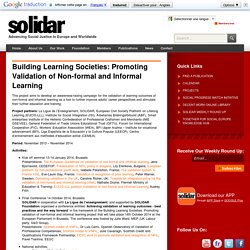
Project partners: La Ligue de l’Enseignement, SOLIDAR, European Civil Society Platform on Lifelong Learning (EUCIS-LLL), Institute for Social Integration (ISI), Arbetarnas Bildningsförbund (ABF), Small enterprises Institute of the Hellenic Confederation of Professional Craftsmen and Merchants (IME GSEVEE), General Federation of Trade Unions Educational Trust (GFTU), Forum for International Cooperation (FIC), Workers’ Education Association (WEA), BFI Upper Austria – Institute for vocational advancement (BFI), Liga Española de la Educación y la Cultura Popular (LEECP), Centre d’entraînement aux méthodes d’éducation active (CEMEA) Period: November 2013 – November 2014 Activities: Funded by: European Commission, DG Education and Culture.
Policy Debate “Validation of learning outcomes: opportunities and threats for non-formal education” / Agenda. Validation of skills and qualifications acquired through non-formal and informal learning. Il 13 aprile 2015, il Comitato economico e sociale europeo (CESE) terrà un’udienza per raccogliere informazioni e opinioni sul ruolo dell’apprendimento non formale e informale come un mezzo per migliorare l’occupabilità e la mobilità. Inoltre, esaminerà come i datori di lavoro, i sindacati e le organizzazioni della società civile potrebbero essere maggiormente coinvolti nel processo di convalida. L’udienza è il primo passo verso l’elaborazione di un parere d’iniziativa sul ‘Riconoscimento delle competenze e delle qualifiche acquisite attraverso l’apprendimento non formale e informale – L’ingresso pratico della società civile organizzata’. L’udienza si terrà nella sede de l’European Economic and Social Committee, Jacques Delors building Room JDE 51 (fifth floor), Rue Belliard 99, Brussels Per maggiori informazioni sul programma:
Validation of skills and qualifications acquired through non-formal and informal learning. Glossary.